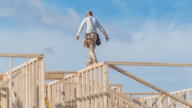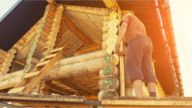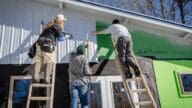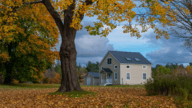Building a House in Texas? Here Is What It Might Cost You
- Published on
- 11 min read
-
 Madeline Sheen, Contributing AuthorClose
Madeline Sheen, Contributing AuthorClose Madeline Sheen Contributing Author
Madeline Sheen Contributing AuthorMadeline Sheen is a passionate writer and editor with experience in real estate, personal finance, and mortgage content. Along with serving as an associate editor for HomeLight, she’s worked in the mortgage industry since 2019 and holds a BA in Communications from California State University, Monterey Bay.
-
 Alexandra Lee, Associate EditorClose
Alexandra Lee, Associate EditorClose Alexandra Lee Associate Editor
Alexandra Lee Associate EditorAlexandra is an associate editor of HomeLight.com. Previously, she served as a writer and social media manager at Santa Barbara Life & Style Magazine, in addition to interning at the nonprofit honors society Phi Beta Kappa. Alexandra holds a bachelor's degree in communication and global studies from UC Santa Barbara, and she has three years of experience reporting on topics including international travel, luxury properties, celebrity interviews, fine dining, and more.
Many homebuyers in Texas consider a new construction property rather than an existing home. According to Fort Worth-based real estate agent Lily Moore, the average costs to build a house in Texas can actually make undertaking new construction the more affordable option right now.
“Building a house in Texas is still quite affordable compared to other states,” says Moore. “We don’t have a state income tax, we have low property taxes — more people than ever are looking at new construction over existing homes.”
Moore adds that some Texas builders are offering low interest rates and closing cost incentives, providing real money-saving benefits for buyers who choose to build a new home.
As is always the case with real estate, pricing depends on everything from location to design preferences. But, on average, for an entry-level new construction home in Texas, Moore says that buyers can anticipate spending about $325,000 for a 1,600 or 1,700-square-foot house.
She clarifies that this would be a new home purchased from a builder — otherwise known as a spec home or a tract home — which is the most common arrangement in Texas.
Comparatively, Moore says pricing on similarly sized existing homes is around $295,000 or $300,000 in the current market, and most of those homes were built in the 1980s and 90s. This means they are likely due for upgrades or repairs that will add additional costs — something you won’t have to worry about when building a new home.
For custom home pricing, Moore does admit that pricing will start considerably higher — around $700,000.
“It’s quite a big price difference, but it’s also for more space. Custom builds are typically no less than 2,600 square feet up to 5,000 square feet,” she says. “You’ll also have the benefit of getting more land if you buy through a custom builder because the lots can be on half an acre or one acre.”
Variables aside, let’s take a closer look at the average costs to build a new home.
Breaking down the average cost to build a house in Texas in 2025
Remember that the price ranges we’re providing are general estimates. Your agent and, eventually, your builder can give you much more specific information on pricing.
| Building Phase | Average cost nationwide (2025) |
| Foundation | $9,444 |
| Framing | $4,537 |
| Roof | $9,511 |
| Siding | $11,520 |
| Appliances | $2,100-$5,400 |
| HVAC System | $5,000-$12,500 |
| Plumbing System | $371-$2,133 |
| Electrical System | $5,000-$10,000 |
| Building Permits | $1,000-$3,000 |
| Finishes and Fixtures | $30,181-$321,021 |
Buying a plot of land ($4,737 per acre)
The 3Q2024 report from the Texas Real Estate Research Center showed that the price of land in Texas increased 2.36% year over year to $4,737 per acre.
The exact cost will, of course, depend on location, demand, and lot size (for example, recreational or residential). This is where an expert buyer’s agent comes in handy. Work with your agent to scour local land listings to find the perfect plot to build your home.
According to a March 2024 report by the National Association of Realtors, national land sales rose 1.2% in 2023, moderating from previous years. Land sales for residential use were also up, accounting for 1.4% of all residential real estate sales in 2023.
Here are some things to consider:
- Land improvements: The costs to clear the land and excavate can add up quickly, so be sure to account for these costs in your land budget.
- Soil type: Clay soils are prone to foundation issues due to their expansion in wet conditions, while clay loam is less prone to expansion and is less likely to cause shifting, cracking, or other damage to the home’s foundation.
- Local zoning laws: Individual cities and towns will have regulations on square footage, utilities, and land use. Be sure to consult with your buyer’s agent to make sure you are buying the right plot of land for what you plan to build on it.
Foundation ($4,039 and $14,848)
Foundation costs will vary depending on whether you’re pouring a slab or digging a basement, but a typical price range is between $4,039 and $14,848.
Framing ($14,000-$32,000)
Framing is when the sticks go up, and a structure actually starts to take shape. Expect to pay between $14,000 and $32,000 for this if you’re building a 2,000-square-foot Texas home. The more complex the home is, the more expensive the framing will be.
For example, the cost to frame a standard 750-square-foot addition would range between $4,500 and $7,500, or between $6 and $10 per square foot on average. Keep in mind that more intricate or complex designs will likely fall towards the higher end of the cost range.
Roof ($5,865-$47,000)
Roofing doesn’t come cheap — whether you’re putting one on a new house or replacing the roof on an existing home. The costs of a new roof typically range from $5,866 to as high as $47,0000.
Asphalt shingles are the most common roofing material in Texas, costing between $5,800 and $20,000. Metal roofs, however, are becoming more popular as they are generally more energy-efficient and last longer than shingle roofs. Metal roofs are more expensive than traditional shingles, costing up to $25,000.
Siding ($5,561-$17,623)
Siding is another big variable: Are we talking vinyl, wood, brick, concrete, stone, stucco, or something else entirely? Siding costs range between $5,561 and $17,623, with common vinyl or engineered wood siding typically priced between $3 and $12 per square foot. If you decide to replace your siding yourself, you can save between $40 and $75 per hour in labor costs.
Appliances ($2,100-$5,400)
You guessed it — appliance pricing also varies widely. Depending on brand, functionality, finish, and so on, you’ll spend an average of $2,100 and $5,400, but you can certainly spend up to $13,000 or more on high-end appliances.
HVAC System ($5,000-$12,500)
Depending on the size of your home, the installation of a new heating and cooling system could cost $5,000 to $12,500.
Plumbing System ($371-$2,133)
Plumbing can cost anywhere from $371 to $2,133 on average. The cost to replace a pipe (including materials and labor) is approximately $1,252, which covers a range of pipe replacements — from the P-trap under your bathroom sink to the sewer line in your yard.
Electrical System ($130-$6,217)
The cost to wire a house is, on average, between $130 to $6,217.
Building Permits ($1,000-$3,000)
Permits vary by state, city, and county. In Texas, they range from $1,000 to $3,000. The exact cost depends on the project’s total value or square footage.
Finishes and Fixtures
Finishes and fixtures comprise everything from countertops to sinks, lighting to flooring. Needless to say, pricing varies wildly and depends heavily on your preferences.
Average carpet installation costs can start at several hundred or thousand dollars, going from $782 to $2,812, while hardwood flooring installation starts at around $2,469 to $7,032.
Laminate countertops may be priced from $841 to $1,738, while granite averages from $10 to $140 per square foot.
Additional costs of building a custom home in Texas
As we mentioned, building a custom home usually comes with additional costs. Again, your agent can help you determine more accurate costs — these are average figures provided to give you an idea.
Architect services (5%-20% of the total project cost)
According to Angi, architects typically charge between 5% and 20% of the total project costs. For remodeling projects, some professionals may charge up to 10% to 20%, while for new construction jobs, fees can be as low as 8%. The typical cost of hiring an architect, regardless of their specialization, falls between $2,191 and $11,571, with an average fee of $6,653.
Land survey ($376-$767)
Land surveys, which identify your property lines and land features, cost an average of $2,300.
Excavation and grading ($1,660-$6,716)
If you’re buying a tract home, the land price will be rolled into the overall price to build a home. If you’re buying a lot on your own and then building a custom home, expect to pay between $1,660 and $6,716 for excavation.
As mentioned above, depending on the soil type of the land you are building on, excavation and grading costs can increase if there are underground obstructions such as rock shelves or boulders.
More affordable options for building a home in Texas
While going with a bare-bones building strategy can get you into a new construction home for less, cheaper isn’t always better. Poor build quality will inevitably lead to problems down the road. Anything from a leaky roof to poor sound insulation can be a frustrating discovery when you’ve only been in your new home for a few months. And there’s value in creating a home you genuinely want, not just one you’re settling for.
Alternative home-building options can give you more for your money and offer valuable flexibility during the construction process.
Tiny homes ($30,000-$60,000)
A tiny house is usually 600 square feet or less in size. They’re not ideal for large families, but building a tiny house can be faster and more affordable than a conventional home if one is a good fit for your lifestyle. On average, tiny homes cost between $30,000 and $60,000 to build.
According to a report by Architectural Digest, Texas ranks among the top three states with the highest number of luxury tiny homes for sale. Moore says that tiny homes are not especially common in her Fort Worth market, however, which means prospective buyers may need to do extra legwork to find a builder for this type of house.
Modular and prefabricated homes ($121,400)
In Moore’s market, modular homes are not common — but, in general, modular homebuilding in Texas tends to start at $42 per square foot, with an average of $121,400.
If I were a buyer, I would look into a new home because they’re more energy-efficient, they tend to increase in value long-term, and right now, they’re even more affordable than resale homes. For our clients, we do recommend looking into new construction before we even start looking at existing homes.


Building a home in Texas is a great value
Between eager builders and plenty of available space for new homes, Moore believes it’s a great time to build a home in Texas.
In terms of timeframe, Moore says that since many builders have so many spec homes underway, it’s possible to get into a new construction home within just two or three months of signing a contract. Expect a wait of around ten months on a custom house purchased through a builder, and up to 24 months if you’re buying a raw piece of land and doing everything from scratch.
Moore encourages buyers to work closely with an agent who has experience with new construction homes and is familiar with the builders in the area. Quality, of course, can vary considerably, and it’s best to have the guidance of an agent who knows what to expect. It’s also nice to have someone in your corner who can help you realize what’s possible when you perhaps thought otherwise.
“A lot of buyers think they won’t qualify for a new construction loan when the qualifications are actually the same,” says Moore. “When we start comparing apples to apples, I would say that 99% of the time, buyers decide to go with new construction over a preexisting home.”
Between great savings, a quick road to completion, and the peace of mind that comes from knowing you’re the first person to live there, building a house in Texas is definitely the way to go in 2025.
Header Image Source: (Bailey Alexander / Unsplash)
- "Texas modular homes," Modular Homes
- "How Much Does a Tiny House Cost?," HomeAdvisor (January 2024)
- "How Much Does Excavation Cost? [2025 Data]," Angi (November 2024)
- "2025 Architect Cost: Average Cost to Hire an Architect," Angi (November 2024)
- "How Much Does Countertop Installation Cost? [2025 Data]," Angi (August 2024)






